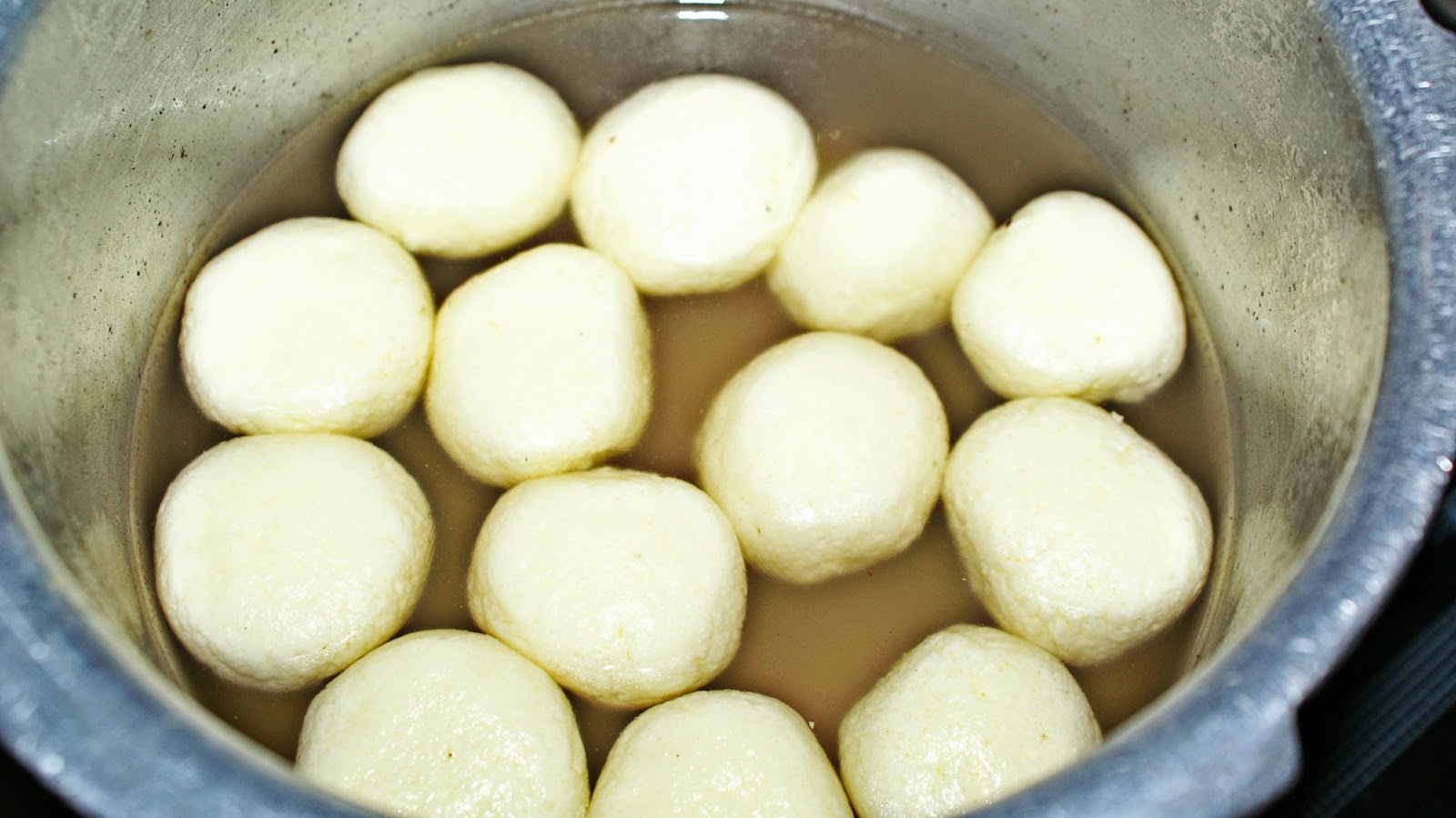Rasgulla is a traditional Bengali Sweet. It is appreciated for its smooth texture and the simplicity of the flavour. Often people buy Rasgulla tins from a store, but it is one of sweets which can be made passionately at home. Here is a simple recipe which shows you how to make delicious Rasgulla at home.
Ingredients:
1 litre - Milk
2 tbs - Lemon Juice (or vinegar or citric acid)
1.5 cup - Sugar
1 pinch - Cardamom powder (optional)
4 cups - Water
Pour the milk into a large thick vessel and place it on a low flame.
Meanwhile grab a stainless steel juice strainer as shown. Avoid using coffee/tea strainers for this job.
Cover it with a thin white cotton cloth as shown.
When the milk is hot enough (just before it raises up) squeeze the lemon juice as shown. Make sure the quantity of the lemon juice is around 1-2 tablespoons so that this is enough to turn milk into curds and whey. Curds are the solid part, whey is the liquid part. This step is the same as you make milk cheese.
Allow the milk gently to heat up and boil.
Slowly you can see now the milk is split into curds and whey. Make sure the whey is watery enough. Which means there is no milk-solids left in whey water. Now it is ready to strain and separate the curds.
Strain this mixture as shown below so that you collect only the curds in the strainer.
For 1 litre of milk you get almost 1-cup quantity of milk solid.
Note: If you tend to get much lesser quantity than this, then the milk is either not so good or more diluted with water or you have not heated and waited enough after adding the lemon juice earlier.
Once the whey water is strained, you can run through some tap water though this so that it washes the curds. This will also wash away the lemon juice and refines the flavour.
Meanwhile now you can prepare the sugar syrup. So take a cup of sugar and add it in a pressure cooker with 4 cups of water as shown. If you do not have a pressure cooker you can use large thick vessel. But never use a wide saucepan.
Keep this on a low flame so that slowly sugar crystals will start getting dissolved.
Into it add just a small pinch of cardamom powder so that the syrup gets saturated with the cardamom flavour.
Once the curds are washed you can gently knead it. This will have a consistency like a dough which you can form into a small ball as shown.
Tip: Make sure you knead all the lumps into a consistent dough. If you knead too harsh it will spoil and make harder Rasgullas else if you do not knead properly it may result Rasgullas to split when you cook them with sugar syrup.
Now you can spread the contents as shown.
Make small equal sized balls as shown. The size of these balls should be around 1/2 the size of finished Rasgulla. So that when it is cooked with Sugar Syrup it will gently expand almost double the size.
When the sugar syrup is mildly hot enough, gently put these balls into the same.
Cover the lit and gently steam it for 8-10 minutes. Do not put the weight on top of pressure cooker, instead to slow down escape of the steam you can cover it with a cup as shown. This should allow steam to escape at a slow rate.
Once it is steamed, you can reduce the flame and open the lid, you can see the Rasgullas puffed up. Turn off the flame. Gently stir and cover the lid. Allow it to cool down for around 20 minutes.
Tip: Taste the sugar syrup once it is cooked just before turning off the flame. If it is too sweet you can add 3-10 tablespoons of water to adjust the sweetness of the sugar syrup. Leave it for 1/2 a minute and turn off the flame. Since the water gets evaporated during cooking, it may increase the concentration of the sugar syrup. By adding little water you can get the right consistent concentration of the sugar syrup.
Tip: Taste the sugar syrup once it is cooked just before turning off the flame. If it is too sweet you can add 3-10 tablespoons of water to adjust the sweetness of the sugar syrup. Leave it for 1/2 a minute and turn off the flame. Since the water gets evaporated during cooking, it may increase the concentration of the sugar syrup. By adding little water you can get the right consistent concentration of the sugar syrup.
Transfer the contents into a large bowl as shown. Cover it with a lid and refrigerate for a day. And serve next day so that its flavor, texture and taste gets mature. Tasty fluffy home made Rasgullas are ready to be served.
Hope you liked our recipe. Kindly do post your comments and suggestions.
Explore my Ethnic YouTube Channel: Sarees are my passion:
Explore my Ethnic YouTube Channel: Sarees are my passion:
cheers, Kiran & Bindu.



















Comments
Post a Comment